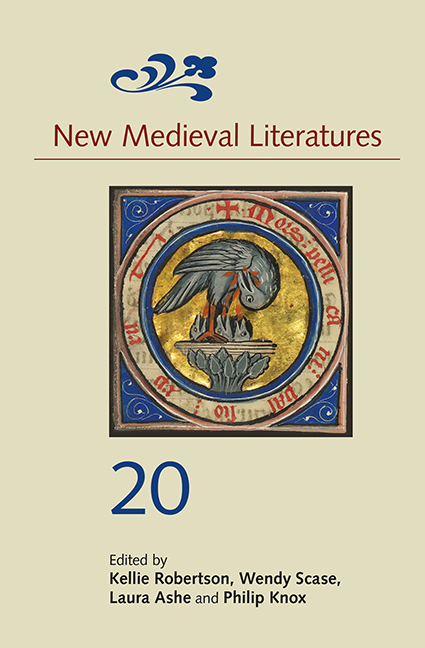Book contents
- Frontmatter
- Contents
- List of Illustrations
- List of Abbreviations
- 1 Lion-Keu-Coupé: A Missing Link in Yvain or Le Chevalier au Lion
- 2 John of Howden’s Rossignos and the Sounds of Francophone Devotion
- 3 ‘Wereyed on every side:’ Chaucer’s Troilus and Criseyde and the Logic of Siege Warfare
- 4 ‘Ave ave ave [ave]:’ The Multilingual Poetics of Exuberance in Bruder Hans
- 5 Performative Typology, Jewish Gender and Jesus’s Queer Romance in the York Corpus Christi Plays
- 6 Locating Charles d’Orléans: In France, in England and Out of Europe
- 7 Urinals and Hunting Traps: Curating Fifteenth-Century Pragmatic Books
2 - John of Howden’s Rossignos and the Sounds of Francophone Devotion
Published online by Cambridge University Press: 30 April 2020
- Frontmatter
- Contents
- List of Illustrations
- List of Abbreviations
- 1 Lion-Keu-Coupé: A Missing Link in Yvain or Le Chevalier au Lion
- 2 John of Howden’s Rossignos and the Sounds of Francophone Devotion
- 3 ‘Wereyed on every side:’ Chaucer’s Troilus and Criseyde and the Logic of Siege Warfare
- 4 ‘Ave ave ave [ave]:’ The Multilingual Poetics of Exuberance in Bruder Hans
- 5 Performative Typology, Jewish Gender and Jesus’s Queer Romance in the York Corpus Christi Plays
- 6 Locating Charles d’Orléans: In France, in England and Out of Europe
- 7 Urinals and Hunting Traps: Curating Fifteenth-Century Pragmatic Books
Summary
John of Howden (d. 1275?), theologian and clerk to Eleanor of Provence and Henry III, is best known for his nine Anglo-Latin devotional poems. Among the most celebrated of these poems is Philomena, a meditation on the life and passion of Christ that enjoyed an afterlife as a source of inspiration for a host of English religious writers, including Richard Rolle, whose Incendium Amoris draws on the eponymous nightingale of Howden's Philomena. Like Rolle, famous for his audition of angelic canor, Howden's poems – Philomena perhaps foremost among them – abound in lyric effusions, musical imagery and elaborately structured sonic patternings. In recent years, criticism has brought to light the spiritual import of sound in contemplative and devotional texts like Philomena, the Incendium Amoris and others with a more latent kind of musicality, such as books of hours. Echoing this vein of historical sound studies, this chapter turns to the audible and inaudible sounds of Rossignos, Howden's masterful Anglo-French adaptation of Philomena composed between 1273 and 1282. In what follows, I will attend to these sounds and argue not only for the central importance of the language and thematics of music to the narrative of Rossignos, but also for the significance of the poem's very sonic material as a spiritual conduit and a form of devotional practice. Although the celestial music of heaven remains out of earshot for Howden and his audience, the ‘virtual environment’ constructed through the embodied performance and reception of Rossignos carves out an intermediary space between the heavenly and the mundane, its readers and listeners in harmony – if only for the duration of the poem's reading – with the angelic choirs all the while rooted in the phenomenological acoustics of this world.
While Rossignos is based on Philomena, Howden's adaptation of the Latin text is more paraphrase than direct translation. Accordingly, the sounds and poetry of Rossignos are resolutely vernacular. Its most recent editor notes that Howden borrows almost no vocabulary from Latin into French, preferring instead to fashion this vernacular through the affordances of its morphology.
- Type
- Chapter
- Information
- New Medieval Literatures 20 , pp. 46 - 73Publisher: Boydell & BrewerPrint publication year: 2020



